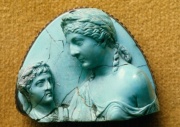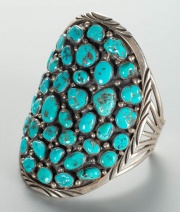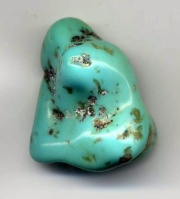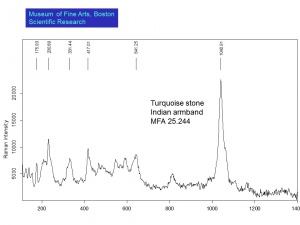Difference between revisions of "Turquoise"
| Line 1: | Line 1: | ||
| − | [[File:99.109-37-18.jpg|thumb|]] | + | [[File:99.109-37-18.jpg|thumb|Roman cameo MFA 99.109]] |
== Description == | == Description == | ||
An opaque sky-blue semiprecious gemstone. Turquoise is composed of a hydrated basic copper aluminum phosphate mineral. It was used for beads as early as 5000 BE in Mesopotamia. Major deposits were worked in Iran (Nishapur, Juh-e Zar, Kuh-i-Firouzeh) and on the Sinai Peninsula. Turquoise is also found in Siberia, Turkestan, Germany (Saxony), France, England (Cornwall), Australia and the U.S.(Mexico, Arizona, Colorado, California, New Mexico). Turquoise can be blue, greenish blue or green with inclusions of red sandstone. Turquoise is used for cabochon jewelry, inlays, beads and small carvings. | An opaque sky-blue semiprecious gemstone. Turquoise is composed of a hydrated basic copper aluminum phosphate mineral. It was used for beads as early as 5000 BE in Mesopotamia. Major deposits were worked in Iran (Nishapur, Juh-e Zar, Kuh-i-Firouzeh) and on the Sinai Peninsula. Turquoise is also found in Siberia, Turkestan, Germany (Saxony), France, England (Cornwall), Australia and the U.S.(Mexico, Arizona, Colorado, California, New Mexico). Turquoise can be blue, greenish blue or green with inclusions of red sandstone. Turquoise is used for cabochon jewelry, inlays, beads and small carvings. | ||
| − | [[File:2004.2219-SC138132.jpg|thumb|]] | + | [[File:2004.2219-SC138132.jpg|thumb|Roman cameo MFA 99.109]] |
== Synonyms and Related Terms == | == Synonyms and Related Terms == | ||
Revision as of 09:40, 8 June 2018
Description
An opaque sky-blue semiprecious gemstone. Turquoise is composed of a hydrated basic copper aluminum phosphate mineral. It was used for beads as early as 5000 BE in Mesopotamia. Major deposits were worked in Iran (Nishapur, Juh-e Zar, Kuh-i-Firouzeh) and on the Sinai Peninsula. Turquoise is also found in Siberia, Turkestan, Germany (Saxony), France, England (Cornwall), Australia and the U.S.(Mexico, Arizona, Colorado, California, New Mexico). Turquoise can be blue, greenish blue or green with inclusions of red sandstone. Turquoise is used for cabochon jewelry, inlays, beads and small carvings.
Synonyms and Related Terms
turqoius; calliana; callais; Mecca stones; Türkis (Deut.); turquesa (Esp., Port.); turquoise (Fr.); turkoise (Ned.)
Other Properties
Triclinic system, opaque, dense, cryptocrystalline to fine-grain massive.
Fracture is conchoidal. Luster = waxy. Streak = white to pale-green.
Soluble in hot hydrochloric acid.
| Composition | CuAl6(PO4)4(OH)8 - 4H2O |
|---|---|
| Mohs Hardness | 5 - 6 |
| Density | 2.6-2.9 |
| Refractive Index | 1.61; 1.62; 1.65 |
Hazards and Safety
Stone can discolor to green with wear or contact with oils and grease
Additional Information
Mineralogy Database: Turquoise
Comparisons
Properties of Common Gemstones
Sources Checked for Data in Record
- Jack Odgen, Jewellery of the Ancient World, Rizzoli International Publications Inc., New York City, 1982
- R.F.Symmes, T.T.Harding, Paul Taylor, Rocks, Fossils and Gems, DK Publishing, Inc., New York City, 1997
- A.Lucas, J.R.Harris, Ancient Egyptian Materials and Industries, Edward Arnold Publishers Ltd., London, 4th edition, 1962
- Encyclopedia Britannica, http://www.britannica.com Comment: "turquoise" Encyclopædia Britannica. [Accessed September 19, 2003].
- C.W.Chesterman, K.E.Lowe, Audubon Society Field Guide to North American Rocks and Minerals, Alfred A. Knopf, New York, 1979
- Wikipedia, the free encyclopedia, at http://www.wikipedia.com Comment: http://en.wikipedia.org/wiki/Turquoise (Accessed Nov. 9, 2005)
- Encyclopedia of Archaeology, Glyn E. Daniel, ed., Thomas Y. Crowell Co., New York, 1977
- G.S.Brady, Materials Handbook, McGraw-Hill Book Co., New York, 1971 Comment: p. 833
- Van Nostrand's Scientific Encyclopedia, Douglas M. Considine (ed.), Van Nostrand Reinhold, New York, 1976
- Michael McCann, Artist Beware, Watson-Guptill Publications, New York City, 1979



